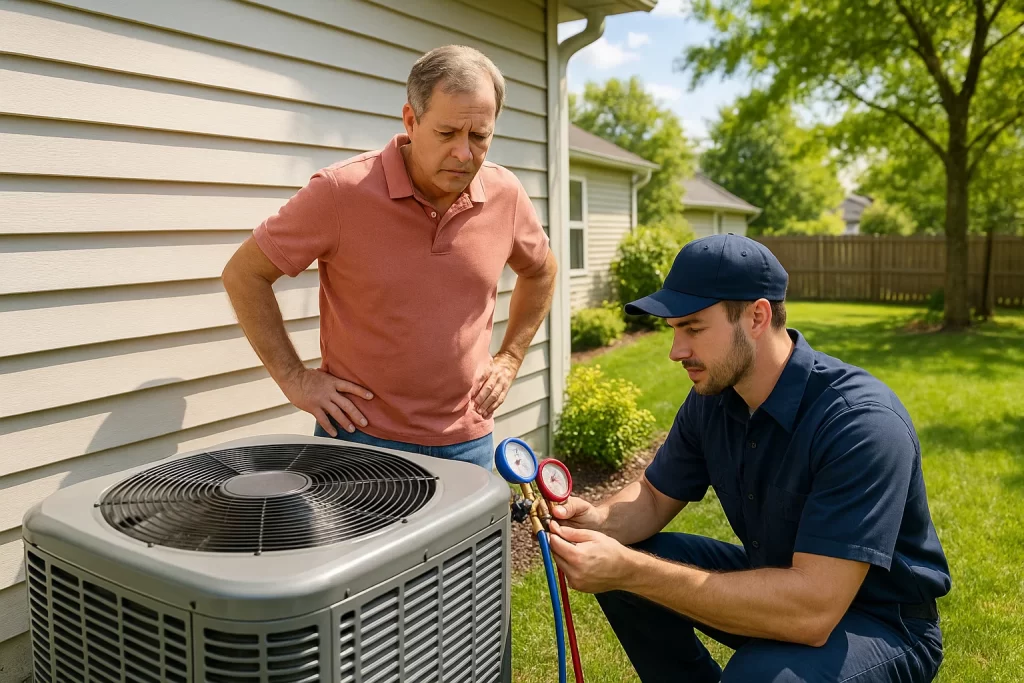When the summer heat rolls in, your air conditioner becomes the star player in your home’s comfort team. But if your AC starts acting up, the discomfort can be immediate—and frustrating. Before you panic or reach for the phone, some common air conditioning issues can be addressed with basic troubleshooting. Avoiding regular AC maintenance is often the root cause behind many of these problems. Knowing what to look for and when to call in the pros can save you time, money, and a whole lot of sweat.

1. Basic Cooling Issues: Easy Fixes for No Cold Air
Problem: Your AC is running, but the air coming from the vents isn’t cold.
DIY Fixes:
- Check the thermostat settings. Make sure it’s set to “cool” and the temperature is lower than the current room temp.
- Replace or clean the air filter. A clogged filter restricts airflow and makes your system work harder.
- Clear debris around the outdoor unit. If leaves, dirt, or other blockages are suffocating your condenser, the system can’t release heat properly.
Call a Pro If: You’ve checked the basics and the system still isn’t cooling. This could signal low refrigerant, a malfunctioning compressor, or a frozen evaporator coil, all of which require annual AC tune-up appointments to catch early before they escalate.
2. AC Running but Warm? Key Troubleshooting Steps
Problem: Your home feels only slightly cooler, or it takes forever to reach the desired temperature.
DIY Fixes:
- Close blinds and curtains to block out sunlight and reduce heat gain.
- Seal windows and doors to prevent cool air from escaping.
- Ensure vents are open and unblocked throughout the home.
Call a Pro If: These adjustments don’t improve performance. Undersized units, refrigerant issues, or failing parts could be the cause.
3. Diagnosing AC Noises: Hissing, Banging, and Buzzing
Problem: Your AC is making noises that aren’t part of its usual hum.
DIY Fixes:
- Inspect for debris like sticks or leaves in the outdoor unit fan.
Call a Pro If:
- A buzzing sound could point to electrical problems.
- Hissing might indicate a refrigerant leak.
- Banging or rattling could mean a broken blower or compressor part.
It’s best not to ignore strange noises—what starts as a rattle can quickly turn into a major repair.
4. AC Short Cycling Explained: Causes and Solutions
Problem: Your AC starts up, runs for a short time, and then shuts off again—repeating this cycle throughout the day.
DIY Fixes:
- Change the thermostat batteries if it’s not hardwired.
- Check the air filter—again, a clogged filter can lead to overheating and short cycling.
Call a Pro If: Short cycling continues. It could be caused by a refrigerant issue, a miscalibrated thermostat, or even an improperly sized system.
5. Solving Indoor Humidity and AC Water Leaks
Problem: You notice water pooling near the unit or your home feels unusually humid.
DIY Fixes:
- Ensure the drain pan isn’t cracked, leaking, or overflowing.
Call a Pro If: You can’t stop the leak or if humidity levels remain high. Persistent issues can lead to mold and property damage without preventive AC maintenance steps taken regularly.
When It’s Time to Call an AC Technician
While many basic troubleshooting steps can restore your comfort, some problems are best left to certified HVAC technicians. Call a pro if you experience:
- Warm air even after checking filters and settings
- Strange electrical smells or tripped breakers
- Frozen coils or refrigerant leaks
- Anything involving internal components or electrical issues
Frequently Asked Questions
Question: What should I do if my air conditioner is running but not blowing cool air?
Answer: First, check the thermostat settings to ensure it’s set to “cool” and set below the current room temperature. Replace or clean the air filter and remove debris from around the outdoor unit. If that doesn’t help, the issue may involve refrigerant levels, a frozen coil, or compressor problems, which require a technician.
Question: What actions can I take if my home isn’t cooling efficiently?
Answer: Close blinds or curtains during the day, seal any leaks around doors or windows, and ensure vents are fully open and unblocked. If comfort issues persist, the system might be undersized, low on refrigerant, or have a faulty component needing professional attention.
Question: What are common signs that indicate I should call a technician?
Answer: Noises like hissing, buzzing, or banging, along with frequent cycling, water leaks, or excessive indoor humidity are red flags. These often point to refrigerant leaks, electrical issues, or broken parts—situations that are best handled by a licensed technician.
Shafer Heating & Cooling, LLC: You are just one call away from the comfort and savings you deserve! Schedule an appointment today for HVAC services.
